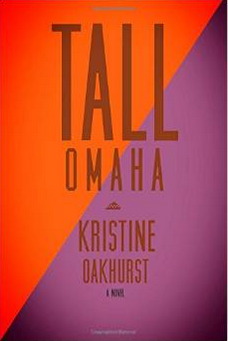From now until June 6th – the last day of horse racing’s Triple Crown – author Kristine Oakhurst is donating to Vegan Outreach 100% of her royalties from the book Tall Omaha, a touching story that sheds light on the horse racing industry.
Who is Kristine Oakhurst, how did her love for horses inspire her to write Tall Omaha, and why is a horse enthusiast donating to an organization focused on getting cows, pigs, chickens and other farmed animals off of plates? Sure, she’s vegan, but is there more to it? We talk with Kristine to find out more about her story – and the connection between horses and food.
Kristine, tell us about the path that led you to write Tall Omaha.
I had a rough go as a kid. Later, when I was a cop, I saw even more kids with rougher goes. Somewhere along the way, a story synthesized between the overlap of child abuse and animal abuse. [Editor’s Note: The book follows the almost-parallel stories of a young woman and a red filly, both of whom are discarded in their own ways.]
Additionally, most horse stories—novels or movies—are much too saccharine and really gloss over the horse-industry machinery. Tall Omaha is pretty dark. Bleak. But it’s real. A certain type of person really digs it. It mixes personal stories, horrors from my time as an animal cruelty investigator, and realities that are all too common.
Max and the red filly are both near and dear to me. Max is most definitely not autobiographical—she’s much smarter than I was at her age! The book and the main horse protagonist are both named after my own Thoroughbred rescue—Mara—a friend and partner who helped me heal, grow up, and look to the future. Mara was another lady with a rough go; along with vegan/animal welfare issues, I think my pro-woman stance is pretty obvious throughout the book.
What are you most proud of about the book?
I’m proud that it’s not just for horse people. I’m proud that it’s not just for feminists. I’m proud that people like the story. I’m proud that Tall Omaha has spurred a real dialogue about horse industry abuses. Some horse lovers are afraid of truth and conflict and acknowledgement of bad things. Bad things exist; don’t our animal friends know it?!
More than a few people have told me the chapters around the horses being transported from auction or feedlot to slaughter was the final straw in cutting meat out of their diet. So that’s nice!
Why partner with a vegan advocacy organization? What does horse racing have to do with veganism?
Education is stronger than judgement. We need to bring people into the fold, not admonish them for being less-than-perfect vegans. VO does a really good job of this.
Very few people really understand the impact horses and horse racing have on the meat industry. Many people assume horse meat is used for pet food; however, horse meat hasn’t been used in pet food since the 1970s. Instead, the horse meat from unwanted racehorses is used for human consumption.
Wild horses that roam Bureau of Land Management owned lands are routinely rounded up due to overgrazing. However, this overgrazing is a direct result of cattle grazing, not horses. These wild horses are held in small pens and often euthanized. Wild horses are branded and are not supposed to end up at slaughter houses, but there is no oversight, so they end up on dinner plates. All because of the beef industry.
People don’t think of horses being consumed by humans, but they are. Over 200,000 American horses end up on dinner plates each year. Worldwide, around 4.5 million horses are consumed by humans. Horses are the under-defended meat in the vegan/vegetarian fight.
How and when did you become vegan?
I stopped eating meat over 25 years ago. I just couldn’t square loving a cat and eating a pig. As I grew up, I never did consume large quantities of dairy. However, I adopted a completely vegan diet five years ago.
My food choices need to be kind; a vegan diet is the only option. Too many people underestimate the power of their purchases. I want my spending to be a voice. I purchase compassionate products, including my food. And we vegans do make a difference. Every additional person who stops paying for cruelty opens the doors for more compassionate products and options. Look at the proliferation of our food options over the last 25 years. We’re doing good for animals! And our bodies.
What’s one thing that everyone reading can do to help with these huge issues?
Boycott any horse racing, especially the Kentucky Derby, while also educating those around you on the fact that racehorses make millions of dollars for people and often end up tortured, at the end of their lives, at a slaughterhouse.
And buy a book to support Vegan Outreach! It’s a donation for VO, and a gift for you. All the money, 100% of my royalties, will go to VO during this year’s Triple Crown. When you get invited to a derby party, support VO instead.
Finally, describe your perfect vegan meal.
Right now I’m on a Roobin (that’s how I spell it) sandwich kick.
Vegan Reuben (Roobin):
Rye Bread
Daiya Swiss Slices
Tempeh
Sauerkraut
Vegan Thousand Island (Veganaise, sweet relish, smoked paprika, garlic salt, lemon juice, ketchup)
